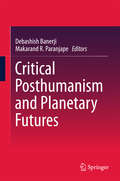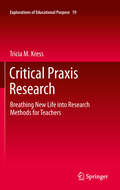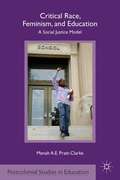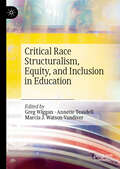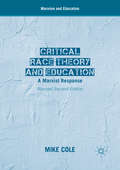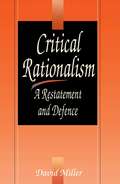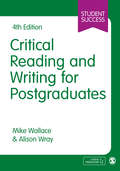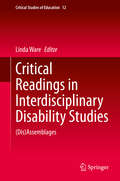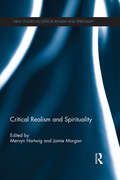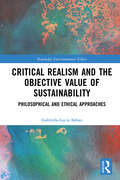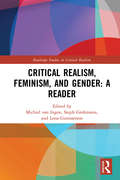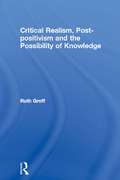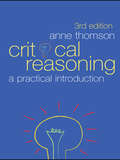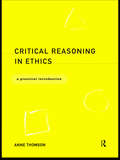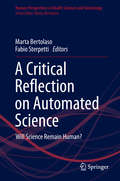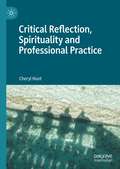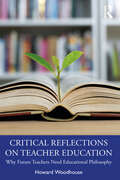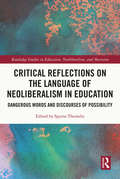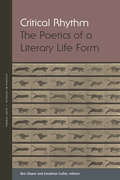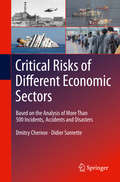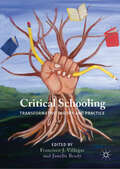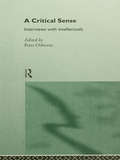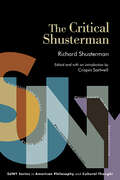- Table View
- List View
Critical Posthumanism and Planetary Futures
by Makarand R. Paranjape Debashish BanerjiThis volume is a critical exploration of multiple posthuman possibilities in the 21st century and beyond. Due to the global engagement with advanced technology, we are witness to a species-wise blurring of boundaries at the edge of the human. On the one hand, we find ourselves in a digital age in which human identity is being transformed through networked technological intervention, a large part of our consciousness transferred to "smart" external devices. On the other hand, we are assisted---or assailed---by an unprecedented proliferation of quasi-human substitutes and surrogates, forming a spectrum of humanoids with fuzzy borders. Under these conditions, critical posthumanism asks, who will occupy and control our planet: Will the "superhuman" merely serve as another sign under which new regimes of dominance are spread across the earth? Or can we discover or invent technologies of existence to counter such dominance? It is issues such as these which are at the heart of this new volume of explorations of the posthuman. The essays in this volume offer leading-edge thought on the subject, with special emphases on postmodern and postcolonial futures. They engage with questions of subalternity and feminism vis-#65533;-vis posthumanism, dealing with issues of subjugation, dispensability and surrogacy, as well as the possibilities of resistance, ethical politics or subjective transformation from South Asian archives of cultural and spiritual practice. This volume is a valuable addition to the on-going global dialogues on posthumanism, indispensable to those, from across several disciplines, who are interested in postcolonial and planetary futures.
Critical Praxis Research: Breathing New Life into Research Methods for Teachers (Explorations of Educational Purpose #19)
by Tricia M. KressCritical Praxis Research (CPR) is a teacher research methodology designed to bridge the divide between practitioner and scholar, drawing together many strands to explain the research process not just as something teacher researchers do, but as a fundamental part of who teacher researchers are. Emphasizing the researcher over the method, CPR embraces and amplifies the skills and passions teachers naturally bring to their research endeavours. Emerging from the tradition of critical pedagogy, Critical Praxis Research: Breathing New Life into Research Methods for Teachers transcends longstanding debates over quantitative vs. qualitative and scholar vs. practitioner research. The text examines the histories and current applications of common methodologies and re-conceptualizes the ways that these methodologies can be used to enhance teachers' identities as practitioners and researchers. It also provides a critical examination of the role of Institutional Review Boards, and explores the complexity and ethics of data collection, data analysis, and writing. Through guiding questions and writing prompts, the author encourages readers to think through the process of design and conducting CPR. The text is theoretically rich, but written in an accessible style infused with metaphor, irony, and humour. Critical Praxis Research: Breathing New Life into Research Methods for Teachers is both instructive and uplifting, sending the message that research is difficult but also joyful, like life itself.
Critical Race, Feminism, and Education
by Menah A.E. Pratt-ClarkeCritical Race, Feminism, and Education provides a transformative next step in the evolution of critical race and Black feminist scholarship. Focusing on praxis, the relationship between the construction of race, class, and gender categories and social justice outcomes is analyzed. An applied transdisciplinary model - integrating law, sociology, history, and social movement theory - demonstrates how marginalized groups are oppressed by ideologies of power and privilege in the legal system, the education system, and the media. Pratt-Clarke documents the effects of racism, patriarchy, classism, and nationalism on Black females and males in the single-sex school debate.
Critical Race Structuralism, Equity, and Inclusion in Education
by Greg Wiggan Annette Teasdell Marcia J. Watson-VandiverThis volume presents Critical Race Structuralism as a framework for analyzing, explaining, and mitigating social and educational inequities. The book explores structural and systemic issues in schools with the aim of promoting greater DEI in education and beyond. With a focus on diversity and inclusion, it also addresses issues such as school policy, teacher pedagogy, curriculum design, and school leadership. The volume provides in-depth analyses of educational challenges to offer deeper conceptual understandings regarding how education can be used to heal and transcend inequities in schools, society, and beyond.
Critical Race Theory and Education: A Marxist Response (Marxism and Education)
by Mike ColeThis book, now in its second edition, focuses on the challenge to Marxism posed by Critical Race Theory as this relates to educational theory, policy, and practices with respect to both the US and UK. Critical Race Theory (CRT) in the realm of Education has a long history in the US, and is now a burgeoning field of inquiry in the UK. Critical Race Theory and Education is the first book-length response to CRT from a Marxist perspective and looks at CRT's origins in Critical Legal Studies, critiques the work of major US and UK Critical Race theorists, and also looks at some of CRT's strengths. CRT and Marxism are contextualized with respect to both neo-liberal global capitalism and imperialism and to anti-racist socialist developments in South America. The book concludes with some suggestions for classroom practice.
Critical Rationalism
by David MillerDavid Miller elegantly and provocatively reformulates critical rationalism-the revolutionary approach to epistemology advocated by Karl Popper-by answering its most important critics. He argues for an approach to rationality freed from the debilitating authoritarian dependence on reasons and justification."Miller presents a particularly useful and stimulating account of critical rationalism. His work is both interesting and controversial . . . of interest to anyone with concerns in epistemology or the philosophy of science."-Canadian Philosophical Reviews
Critical Reading and Writing for Postgraduates (Student Success)
by Mike Wallace Alison WrayReading critically, and writing using critical techniques, are crucial skills you need to apply to your academic work. If you need to engage with published (or unpublished) literature such as essays, dissertations or theses, research papers or oral presentations, this proven guide helps you develop a reflective and advanced critical approach to your research and writing. New to this edition: Two new chapters on basic and advanced writing skills More advice on self-bias and perception Updates and additional examples throughout Updated online resources providing additional support. A Companion Website provides additional resources to help you apply the critical techniques you learn. From templates and checklists, access to SAGE journal articles and additional case studies, these free resources will make sure you successfully master advanced critical skills.
Critical Reading and Writing for Postgraduates (Student Success)
by Mike Wallace Alison WrayReading critically, and writing using critical techniques, are crucial skills you need to apply to your academic work. If you need to engage with published (or unpublished) literature such as essays, dissertations or theses, research papers or oral presentations, this proven guide helps you develop a reflective and advanced critical approach to your research and writing. New to this edition: Two new chapters on basic and advanced writing skills More advice on self-bias and perception Updates and additional examples throughout Updated online resources providing additional support. A Companion Website provides additional resources to help you apply the critical techniques you learn. From templates and checklists, access to SAGE journal articles and additional case studies, these free resources will make sure you successfully master advanced critical skills.
Critical Readings in Interdisciplinary Disability Studies: (Dis)Assemblages (Critical Studies of Education #12)
by Linda WareThis edited volume includes chapters on disability studies organized around three themes: Theory, Philosophy and Critique. Informed by a range of scholars who may or may not fashion their work beneath the banner of disability studies in explicit terms, it draws connections across a range of identities, knowledges, histories, and struggles that may, on the face of the text seem unrelated. The chapters are cross-categorical and interdisciplinary for purposes of complicating disability studies across international contexts and multiple locations that consider practice-oriented and intersectional approaches for analysis and advocacy. This integrative approach heralds more powerful ways to imagine disability and the conversation on disability.
Critical Realism and Spirituality (New Studies in Critical Realism and Spirituality (Routledge Critical Realism))
by Jamie Morgan Mervyn HartwigCritical Realism and Spirituality contextualizes, delineates, explores and critiques the turn to spirituality and religion in critical realism, which has been under way since the mid-1990s, as well as telling its story. It provides incisive discussion and anaysis of the following broad questions: How does critical realism allow and facilitate the resolution of problems in the area of comparative religion? Can it help you to justify your own faith or belief? What are the implications of the new philosophy of meta-Reality for traditional religious studies and how we organize and conduct our lives? A range of distinguished critical realists, theological critical realists and scholars working with related approaches (Roland Benedikter, Roy Bhaskar, Terry Eagleton, Mervyn Hartwig, Alister McGrath, Markus Molz, Jamie Morgan, Andrew Wright and others) bring their talents to bear on this task. While their personal beliefs span the whole spectrum from theism to atheism, they are united by the desire to open up a space for dialogue of one kind or another (intra-faith, inter-faith and/or extra-faith), promoting mutual understanding, respect and the unity and capability for collective emancipatory action on a global scale that humanity is so sorely in need of. This book is therefore, essential reading for students and academics alike in Religous Studies, Theology and Philosophy.
Critical Realism and the Objective Value of Sustainability: Philosophical and Ethical Approaches (Routledge Environmental Ethics)
by Gabriela-Lucia SabauCritical Realism and the Objective Value of Sustainability contributes to the growing discussion surrounding the concept of sustainability, using a critical realist approach within a transdisciplinary theoretical framework to examine how sustainability objectively occurs in the natural world and in society. The book develops an ethical theory of sustainability as an objective value, rooted not in humans’ subjective preferences but in the holistic web of relationships, interdependencies, and obligations existing among living things on Earth, a web believed to have maintained life on Earth over the last 3.7 billion years. It proposes three pillars of sustainability ethics: contentment for the human existence given to us; justice (beyond distributive justice); and meaningful freedom (within ecological and moral limits). Using abductive reasoning, the book infers that there is an out-of-this-world Sustainer behind the Earth’s sustainability acting as a metaphysical source of all being and value. It argues that sustainability value, accepted as a shared understanding of the common good, must guide individual decisions and socio-economic development efforts as a matter of deliberate choice, as well as be built on the awareness that there are non-negotiable, pre-established conditions for our planet’s sustainability. This book will be of interest to students and scholars across fields of inquiry, including sustainability, sustainable development, environmental philosophy and ethics, philosophy of science, and ecological economics, and to whoever may wonder why seasons exists and why humans have creative minds.
Critical Realism, Feminism, and Gender: A Reader (Routledge Studies in Critical Realism)
by Michiel Van IngenIn assessing the current state of feminism and gender studies, whether on a theoretical or a practical level, it has become increasingly challenging to avoid the conclusion that these fields are in a state of disarray. Indeed, feminist and gender studies discussions are beset with persistent splits and disagreements. This reader suggests that returning to, and placing centre-stage, the role of philosophy, especially critical realist philosophy of science, is invaluable for efforts that seek to overcome or mitigate the uncertainty and acrimony that have resulted from this situation. In particular, it claims that the dialectical logic that runs through critical realist philosophy is ideally suited to advancing feminist and gender studies discussions about broad ontological and epistemological questions and considerations, intersectionality, and methodology, methods, and empirical research. By bringing together four new and eight existing writings this reader provides both a focal point for renewed discussions about the potential and actual contributions of critical realist philosophy to feminism and gender studies and a timely contribution to these discussions.
Critical Realism, Post-positivism and the Possibility of Knowledge (Routledge Studies in Critical Realism #Vol. 11)
by Ruth GroffGroff defends 'realism about causality' through close discussions of Kant, Hilary Putnam, Brian Ellis and Charles Taylor, among others. In so doing she affirms critical realism, but with several important qualifications. In particular, she rejects the theory of truth advanced by Roy Bhaskar. She also attempts to both clarify and correct earlier critical realist attempts to apply realism about causality to the social sciences.By connecting issues in metaphysics and philosophy of science to the problem of relativism, Groff bridges the gap between the philosophical literature and broader debates surrounding socio-political theory and poststructuralist thought. This unique approach will make the book of interest to philosophers and socio-political theorists alike.
Critical Reasoning: A Practical Introduction
by Anne ThomsonWe all engage in the process of reasoning, but we don't always pay attention to whether we are doing it well. This book offers the opportunity to practise reasoning in a clear-headed and critical way, with the aims of developing an awareness of the importance of reasoning well and of improving the reader's skill in analyzing and evaluating arguments. In this third edition, Anne Thomson has updated and revised the book to include fresh and topical examples which will guide students through the processes of critical reasoning in a clear and engaging way. In addition, two new chapters on evaluating the credibility of evidence and decision making and dilemmas will fully equip students to reason well. By the end of the book students should be able to: identify flaws in arguments analyze the reasoning in newspaper articles, books and speeches assess the credibilty of evidence and authorities make sound decisions and solve dilemmas approach any topic with the ability to reason and think critically.
Critical Reasoning in Ethics: A Practical Introduction
by Anne ThomsonCritical Reasoning in Ethics is an accessible introduction that will enable students, through practical exercises, to develop their own skills in reasoning about ethical issues such as:* analysing and evaluating arguments used in discussions of ethical issues* analysing and evaluating ethical concepts, such as utilitarianism* making decisions on ethical issues* learning how to approach ethical issues in a fair minded wayEthical issues discussed include the arguments about abortion, euthanasia, capital punishment, animal rights, the environment and war.The book will be essential reading for philosophy, health, social work and nursing courses.
A Critical Reflection on Automated Science: Will Science Remain Human? (Human Perspectives in Health Sciences and Technology #1)
by Marta Bertolaso Fabio SterpettiThis book provides a critical reflection on automated science and addresses the question whether the computational tools we developed in last decades are changing the way we humans do science. More concretely: Can machines replace scientists in crucial aspects of scientific practice? The contributors to this book re-think and refine some of the main concepts by which science is understood, drawing a fascinating picture of the developments we expect over the next decades of human-machine co-evolution. The volume covers examples from various fields and areas, such as molecular biology, climate modeling, clinical medicine, and artificial intelligence. The explosion of technological tools and drivers for scientific research calls for a renewed understanding of the human character of science. This book aims precisely to contribute to such a renewed understanding of science.
Critical Reflection, Spirituality and Professional Practice
by Cheryl HuntThis book explores the concept and facilitation of critical reflection and its implications for professional practice. It draws on the author’s own extensive experience to demonstrate how reflective processes involving metaphor and imagery, as well as critique, can be used not only to understand and articulate key values underpinning professional practice and to generate new theoretical models, but to explore one's own worldview, including the ultimate question: 'Who am I?’. The author incorporates practical examples of reflection-through-writing and other reflective techniques which illustrate how ideas about critical reflection, transformative learning, authenticity and spirituality are intricately entwined within theories and practices of adult learning and professional development. The book highlights the importance of understanding the relationship between personal worldviews, values and professional practice. It draws on the concepts of vocation and professional psychological wellbeing to consider what it means to act authentically as a professional within an audit culture. The book will be invaluable for practitioners, academics and students interested in critical reflection, educational inquiry, autoethnography and the use of the self in and as research, the nature and use of metaphor, and the development of worldviews.
Critical Reflections on Teacher Education: Why Future Teachers Need Educational Philosophy
by Howard WoodhouseCritical Reflections on Teacher Education argues that educational philosophy can improve the quality of teacher education programs in Canada, the United States, and the United Kingdom. The book documents the ways in which the market model of education propagated by governments and outside agencies hastens the decline of philosophy of education and turns teachers into technicians in hierarchical school systems. A grounding in educational philosophy, however, enables future teachers to make informed and qualified judgements defining their professional lives. In a clear and accessible style, Howard Woodhouse uses a combination of reasoned argument and narrative to show that educational philosophy, together with Indigenous knowledge systems, forms the basis of a climate change education capable of educating future teachers and their students about the central issue of our time.
Critical Reflections on Teacher Education: Why Future Teachers Need Educational Philosophy
by Howard WoodhouseCritical Reflections on Teacher Education argues that educational philosophy can improve the quality of teacher education programs in Canada, the United States, and the United Kingdom. The book documents the ways in which the market model of education propagated by governments and outside agencies hastens the decline of philosophy of education and turns teachers into technicians in hierarchical school systems. A grounding in educational philosophy, however, enables future teachers to make informed and qualified judgements defining their professional lives. In a clear and accessible style, Howard Woodhouse uses a combination of reasoned argument and narrative to show that educational philosophy, together with Indigenous knowledge systems, forms the basis of a climate change education capable of educating future teachers and their students about the central issue of our time.
Critical Reflections on the Language of Neoliberalism in Education: Dangerous Words and Discourses of Possibility (Routledge Studies in Education, Neoliberalism, and Marxism)
by Spyros ThemelisRecognizing the dominance of neoliberal forces in education, this volume offers a range of critical essays which analyze the language used to underpin these dynamics. Combining essays from over 20 internationally renowned contributors, this text offers a critical examination of key terms which have become increasingly central to educational discourse. Each essay considers the etymological foundation of each term, the context in which they have evolved, and likewise their changed meaning. In doing so, these essays illustrate the transformative potential of language to express or challenge political, social, and economic ideologies. The text’s musings on the language of education and its implications for the current and future role of education in society make clear its relevance to today’s cultural and political landscape. This exploratory monograph will be of interest to doctoral students, researchers, and scholars with an interest in the philosophy of education, educational policy and politics, as well as the sociology of education and the impacts of neoliberalism.
Critical Rhythm: The Poetics of a Literary Life Form (Verbal Arts: Studies in Poetics)
by Ben Glaser Jonathan Culler Derek Attridge Simon Jarvis David Nowell Smith Haun Saussy Tom Cable Natalie Gerber Virginia Jackson Ewan Jones Meredith Martin Yopie PrinsRhythm constitutes an untapped resource for understanding poetry, making legible a range of ways poetry affects us that cannot be parsed through the traditional resources of poetic theory.Rhythm has rich but also problematic roots in nineteenth-century notions of primitive, oral, communal, and sometimes racialized poetics. But there are reasons to understand and even embrace its seductions, including its resistance to lyrical voice and even identity. Pressing beyond poetry handbooks’ isolated descriptions of technique, the book asks what it means to think rhythm.
Critical Risks of Different Economic Sectors: Based on the Analysis of More Than 500 Incidents, Accidents and Disasters
by Didier Sornette Dmitry ChernovThis book explores the major differences between the kinds of risk encountered in different sectors of industry - production (including agriculture) and services - and identifies the main features of accidents within different industries. Because of these differences, unique risk-mitigation measures will need to be implemented in one industry that cannot be implemented in another, leading to large managerial differences between these broad economic sectors. Based on the analysis of more than 500 disasters, accidents and incidents - around 230 cases from the production sector and around 280 cases from the service sector - the authors compare the risk response actions appropriate within different sectors, and establish when and how it is possible to generalize the experience of dealing with risks in any given industry to a wider field of economic activity. This book is mainly intended for executives, strategists, senior risk managers of enterprise-wide organizations and risk management experts engaged in academic or consulting work. By setting out clearly the sector differences in risk management, the authors aim to improve the practice of general risk assessment with regard to identifying and prioritizing risks, and of risk control with regard to planning appropriate mitigation measures.
Critical Schooling: Transformative Theory And Practice
by Francisco J. Villegas Janelle BradyThis edited volume brings to the foreground the inequities of contemporary schooling in Canada. The editors and authors perform a critical examination of the Canadian schooling space, highlighting the agency and action of marginalized communities and their efforts to address injustice within contexts of schooling. Grounded in the unique perspective of each author, this book provides a venue for transformative practice to create inclusive and socially just contexts for diverse populations, specifically as experienced by peoples who inhabit the intersections of various modes of oppression.
A Critical Sense: Interviews with Intellectuals
by Peter OsborneA Critical Sense brings together in a single volume the leading figures of contemporary radical theory. Moving freely between philosophy, politics and cultural studies, it offers a fascinating overview of the lines of thought of today's intellectual left.Marxism, feminism, psychoanalysis and critical theory, literary studies, deconstruction, pragmatism, postcolonial and queer theory are discussed in a series of interviews from the journal Radical Philosophy. Those interviewed are:Judith ButlerCornelius CastoriadisDrucilla CornellAxel HonnethIstvan MeszarosEdward SaidRenata SaleclGayatri Chakravorty SpivakCornel WestSlavoj ZizekFor those unfamiliar with the often daunting work of some of today's most important thinkers, ACritical Sense will offer an ideal introduction; for those already acquainted with the writings of the theorists interviewed here, the collection will throw new - and often surprising - light on familiar ground.
The Critical Shusterman (SUNY series in American Philosophy and Cultural Thought)
by Richard ShustermanCollecting sixteen key texts on a broad range of key philosophical topics enables readers to perceive the scope of Shusterman's philosophy and appreciate its systematic aspects.Richard Shusterman is one of today's foremost philosophers. His influential and widely translated work is distinctive for its originality and its integration of multiple philosophical perspectives (analytic philosophy, phenomenology, hermeneutics, critical theory, and East Asian thought) to create a new transcultural pragmatist vision. Although most famous for his groundbreaking writings in aesthetics, somatic philosophy, and philosophy as an art of living, these texts are integrally connected with Shusterman's vital views on ontology, epistemology, and philosophy of mind, ethics, and politics. Collecting sixteen key texts on this broad range of topics, The Critical Shusterman enables readers to perceive the scope of Shusterman's philosophy and appreciate its systematic aspects. Editor Crispin Sartwell's superb introduction highlights those aspects in assessing Shusterman's thought in the context of contemporary philosophy while suggesting ways that Shusterman's project could be developed in the future.
